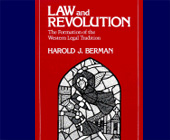 It is not often a book appears that forces the reader to change or challenge long held historic concepts and narratives. Harold Berman’s Law and Revolution: The Formation of the Western Legal Tradition is one such book.
It is not often a book appears that forces the reader to change or challenge long held historic concepts and narratives. Harold Berman’s Law and Revolution: The Formation of the Western Legal Tradition is one such book.
Magisterial in its development, prodigious in its documentation, brilliant in its insight, Berman’s 550-page work traces the history of the Western legal tradition with erudition. In his search for legal roots, he disregards commonly held assumptions and explores horizons often ignored. The conclusions are startling and refreshing.
The book’s central thesis is that at the end of the eleventh century and in the early twelfth century, legal systems appeared for the first time in history. Prior legal orders were primitive, incomplete or undeveloped as he shows in his analysis of Roman and folk law. Berman claims these orders were not systems but collections of rules and concepts embedded inside social custom, which failed to form a conscious body of law. Medieval law, he insists, was the first system with a cohesive body of law, a class of lawyers and a professional judiciary.
Such a claim comes as a major vindication for medieval culture which historians have long turned into a “dark age” where no major progress was made. On the contrary, Berman explodes this myth by citing, with ample evidence, the dynamic nature of medieval legal studies that are the foundation for modern Western law. It was the medieval law commentators (called glossators) who refined and systematized Roman law. They organized into structures past legal codes which were scrambled mosaics of concepts, customs and rules.
Adding to this vindication comes yet another. For the Catholic, it is a pleasant surprise to find Berman, a non-Catholic, unexpectedly citing the Roman Catholic Church’s canon law as the first systematized legal system in history. Moreover, upon the firm foundation of this canon law was built all other Western law systems. In this regard, Berman painstakingly traces how law was, and even now is, influenced by Saint Gregory VII, Saint Anselm, the scholastics and the monastic communities of Cluny.
Another misconception that Berman destroys is the notion of arbitrary rule. He clearly shows that medieval law broke from the ancient and tribal past and established the notion of the rule of law under which ruler and ruled were held accountable under the law. He further shows how all law was subject to natural law if it was to be valid—a tradition that extended even to the foundations of American law, despite modern interpretations to the contrary.
What Does Saint Thomas Say About Immigration?
Perhaps one of his most refreshing insights is his explanation of the organic nature of Western law. It differed from static legal orders that existed among barbarian and pagan peoples. From the foundation of the canon law, the author extensively describes the organic development of flexible medieval law systems that included feudal, manorial, commercial, urban and royal law. The vitality of each system depends upon what Berman calls “the belief in the ongoing character of law,” “its capacity for growth over generations and centuries,” and “a built-in mechanism for organic change.”
Unlike past cultures that relied upon a single legal order for all citizens, the medieval organic order allowed for the maximum autonomy of associations, communities and nations. No other legal order ever managed to provide such freedom to individuals and communities to be governed according to their needs and circumstances. A unique feature of Western law was the fact that the individual person could live under a plurality of legal systems corresponding to the overlapping subcommunities of family, community and faith of which the person was a member.
It becomes evident that it was not only law that progressed inside this order but a whole civilization and its economy benefited from a solid legal foundation never before seen in history.
Written in 1984 and reprinted many times, one perceives that Berman’s work is not the product of some political agenda. He displays a love of law and a zeal for truth that transcends partisan politics. He also laments the decay of law in modern times. The late Harvard University law professor made no secret of the fact that he thought the West is in “the midst of an unprecedented crisis of legal values and of legal thought, in which our entire legal tradition is being challenged.”
What does Saint Thomas Aquinas say about Marriage?
What moved Berman to write was his conviction that the only way to fight this crisis is to instinctively return to one’s origins and roots, and there find the elements for a restoration. Law and Revolution is a splendid contribution toward this return to order since, as Berman notes, “at the most crucial turning points of Western history a projection into the distant past has been needed to match the projection into the distant future. Both the past and future have been summoned, so to speak, to fight against the evils of the present.”


